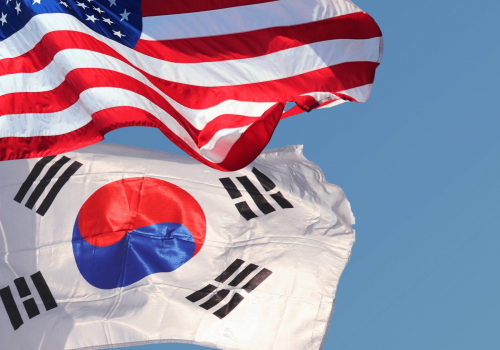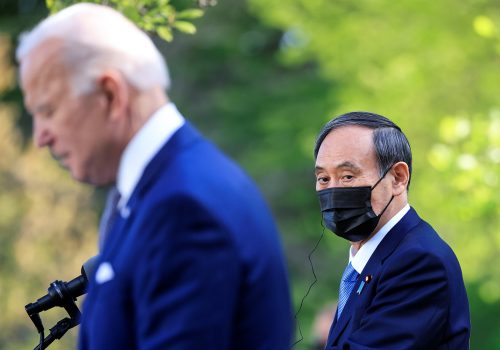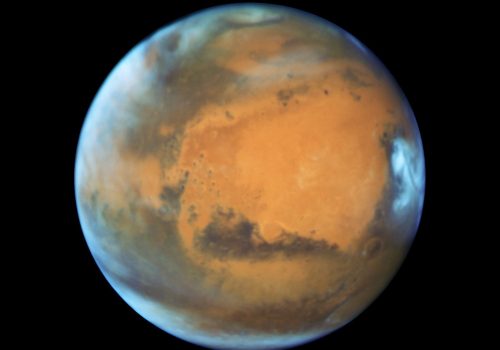FAST THINKING: How do you solve a problem like North Korea?
GET UP TO SPEED
The “pivot to Asia” is back. US President Joe Biden on Friday hosted South Korean President Moon Jae-in, who became the second foreign leader to visit the White House following Japan’s Suga Yoshihide. Biden and Moon laid out a new joint course on North Korea as part of careful steps to strengthen ties—and in some cases box out China. The meeting also saw advances for US vaccine diplomacy, trade, and outer space cooperation. So what does Biden’s North Korea policy look like? What did Moon get out of the meeting? Will the alliance extend to the stars? Our experts are ready for launch.
TODAY’S EXPERT REACTION COURTESY OF
- Markus Garlauskas (@Mister_G_2): Former national intelligence officer for North Korea and nonresident senior fellow at the Asia Security Initiative
- Miyeon Oh (@ACScowcroft): Director of the Scowcroft Center’s Asia Security Initiative
- David Bray (@ACGeoTech): Director of the GeoTech Center and GeoTech Commission
- Inkoo Kang (@inkoo_kang): Research consultant at the GeoTech Center
China shop
- In their joint statement, Biden and Moon emphasized the importance of working with Japan on “upholding common values, and bolstering the rules-based order.” It’s a statement, Markus says, that “could easily be interpreted as signaling trilateral alignment against China’s values and behavior.”
- And it was more than just words. The statement announced South Korea’s decision to end the remaining restrictions on its domestic ballistic missile program, with Biden’s acceptance. Now Seoul “is free to develop and field non-nuclear ballistic missiles that can strike anywhere in the region—including Beijing—with heavy payloads,” Markus notes.
- Still, the leaders chose their words carefully. Miyeon says the leaders avoided any rhetoric that would alienate South Korea’s largest trading partner. She notes: “During the press conference, President Biden didn’t mention China while he talked about freedom of navigation in the South China Sea and security of the Taiwan Strait.”
Subscribe to Fast Thinking email alerts
Sign up to receive rapid insight in your inbox from Atlantic Council experts on global events as they unfold.

Above the DMZ
- Markus says that the two leaders “mostly restated long-standing positions” on North Korea, but it was noteworthy for them to say they would work “in lockstep,” which would rile South Korean and international critics who complain that Washington has been holding Moon back from his goal of expanding engagement with North Korea.
- Meanwhile, “an explicit mention of promoting North Korean human rights seemed almost designed to contradict a former top Moon advisor’s well-publicized comments that human rights must take a back seat to denuclearization diplomacy,” Markus points out.
- But Miyeon says South Korea, always eager for more engagement, notched a win with the joint statement building on the 2018 diplomatic summits between former US President Donald Trump and North Korean leader Kim Jong Un, as well as Moon and Kim.
Wins for Washington and Seoul
- Both leaders, Miyeon says, walked away with goodies. For Biden, that was a $25 billion South Korean investment in secure, resilient supply chains for technologies such as semiconductors and high-capacity batteries, which have seen global shortages. The US goal here, she adds, is a “targeted decoupling” with China.
- Miyeon points out that this pledge went far beyond Japan’s commitments in its own White House meeting and will help fulfill Biden’s domestic pledge to “build back better.”
- South Korea, which has only vaccinated an estimated 5 percent of its population against COVID-19, wanted a big “vaccine swap agreement” with the United States, Miyeon says. That did not come through, but South Korea “was able to secure a targeted US commitment to provide vaccines to 550,000 Korean soldiers who are in contact with US forces in Korea,” she adds, along with the announcement of a “KORUS Global Vaccine Partnership” to ramp up production.
The final frontier
- The news that South Korea is on the verge of joining the Artemis Accords (the Biden-Moon joint statement said the leaders “will cooperate towards [South Korea] signing”) flew under the radar. It would be “a watershed moment for international space exploration,” David says, as it would solidify the accord in Asia just days after China landed a rover on Mars.
- South Korea would join the United States, United Kingdom, Japan, Australia, Canada, Italy, the United Arab Emirates, and Luxembourg in approving guidelines around everything from resource extraction to avoiding conflicts in space. David says Singapore and India could join soon.
- As more countries sign on, Inkoo says, the United States “could position itself as a leader in not just space exploration but also governance.” He adds that South Korea, despite having sent only one astronaut to space so far, “is recognizing that space is becoming increasingly important diplomatically, militarily, and economically.”
- But the growing list of Artemis Accords members—with Russia and China notably absent—raises questions about what space “spheres of influence” would look like, Inkoo says, pointing out that South Korea is not a member of the International Space Station.
- The accords also could conflict with the United Nations Outer Space Treaty, which bars any “national appropriation” of space. “After all,” Inkoo tells us, “if there now may be ‘zones’ that must follow US and allies’ laws in space, couldn’t one interpret those to be pseudo-colonies?”
Further reading
Mon, Mar 1, 2021
Report release: The future of the US-ROK alliance
Report By Barry Pavel, Miyeon Oh, Robert Dohner, Alexander Vershbow, Markus Garlauskas, Todd Rosenblum
In a rapidly changing environment, the US and ROK must develop an integrated strategic vision for security in the Indo-Pacific, innovative approaches to denuclearization, and responses to a rising China.
Fri, Apr 16, 2021
FAST THINKING: Mr. Suga comes to Washington
Fast Thinking By
President Xi, are you watching? US President Joe Biden welcomed Japanese Prime Minister Suga Yoshihide to the White House on Friday. And his first in-person meeting with a foreign leader was designed to send a clear signal to China.
Mon, May 17, 2021
FAST THINKING: Mars, with Chinese characteristics
Fast Thinking By
What does China's arrival on Mars mean for the great-power space race? What are the military implications? Our space experts phoned home with the answers.
Image: US President Joe Biden and South Korea's President Moon Jae-in pose for a picture with Korean War-era Army Colonel Ralph Puckett during a Medal of Honor ceremony for Puckett in the East Room at the White House on May 21, 2021. Photo by Jonathan Ernst/Reuters.


